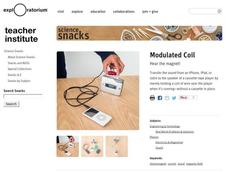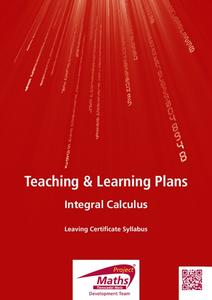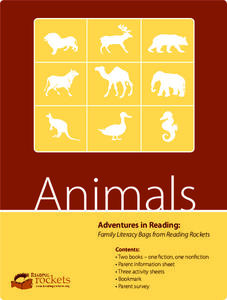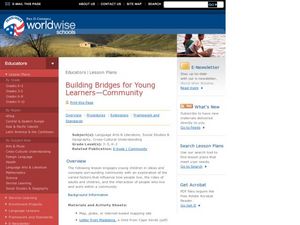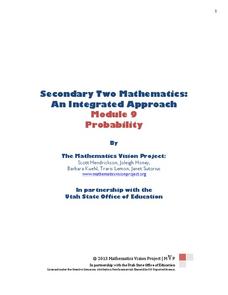K-5 Math Teaching Resources
Number Cube
Building a six-sided number cube has never been so easy. Just cut out the figure on the solid lines, fold on the dotted lines, connect the sides together using glue or tape, and there you have it!
NASA
Tools of the Trade
Did you know every state in the U.S. has at least one observatory? During the lesson, scholars research the cost of building and maintaining an observatory. They must present their information in a proposal to build a new observatory,...
Exploratorium
Modulated Coil
Transmit sound with an electromagnet. Class members follow the provided direction and build an electromagnet that will transmit sound though a cassette-tape player. As as extension they create an air core electromagnet and...
Code.org
Binary Numbers
All you need is a zero and a one. Build pupils' understanding of binary values and number systems to gain familiarity with binary numbers. Using a hands-on activity and technology, scholars learn how the binary system works and its...
EngageNY
Solution Sets to Simultaneous Equations (part 1)
How are systems related? Build on your pupils' previous knowledge of solving systems of equations by introducing systems of inequalities. Learners explore similarities between systems of equations and inequalities to make a strong...
Beyond Benign
Intended Occupants
Here's a lesson you can really build on! Middle schoolers describe the occupants of an imaginary house during a character-building lesson. They create a cast of characters who share living space and provide details about their attitudes,...
Project Maths
Integral Calculus
From derivatives to antiderivatives and back again. Building on the second lesson of the three-part series covering functions, learners explore the concept of an antiderivative. They connect the concept to the graph of the function and...
DocsTeach
Environmental Case Study: Hetch Hetchy Valley
What is more important: building a new school or preserving a nature reserve? Keeping a natural area clean or providing clean drinking water to a city of millions? Young scholars weigh these questions—almost literally—using an...
PBS
Reading Adventure Pack: Animals
Scholars explore the animal kingdom with help from two texts, Blueberries for Sal by Robert McCloskey and A Bed for the Winter by Karen Wallace. The literature and informational text set the learning stage for thoughtful discussion and...
Curated OER
Build a Bar Graph
Learners discover how to use bar graphs. They will gather and organize specific data in order to put it into a bar graph. Then they will answer several questions based on the information they have graphed.
Curated OER
Simply Dazzling!
Color, shape, and pattern can be found and analyzed in almost any setting, but the context in which they are considered here will help connect art, social studies, and acculturation. Little ones check out the piece Eyedazzler Blanket to...
University of Texas
The Origin of Bone Names
The rib bone's connected to the xiphiod! But, what two Greek words are related to xiphiod? And what do certain Latin terms mean? Build understanding of the bones in the human body as well as Latin and Greek vocabulary with a scavenger...
Curated OER
Photo Quilt Square
Build creative thinking and organization skills with a beautiful quilting project. Young photographers use a digital camera and computer to create photo transfers, which they will use to create a photo quilt square. They sew or embroider...
Curated OER
Building Bridges for Young Learners -- Community
Learners compare and contrast communities.They explore factors that influence how people live, the roles of adults and children, and the interaction of people who live and work within a community. The lesson focuses on the country of...
Curated OER
Culture, Race & Ethnicity
Is there a difference between culture, race, and ethnicity? In order to celebrate Harmony Day and cultural diversity, your class will brainstorm, discuss, and discover that there is. The class splits into three groups, each group is...
Baylor College
Healthy Homes
Meant to follow a lesson about how concentrated air particles can be inside of a building, this resource gets individuals to assess the possible air pollutants in their own homes. They take home a worksheet and circle spots on it that...
Mathematics Vision Project
Probability
Probability, especially conditional probability, can be a slippery concept for young statisticians. Statements that seem self-evident on the surface often require a daunting amount of calculations to explicate, or turn out to be...
EngageNY
Analyzing Residuals (Part 2)
Learn about patterns in residual plots with an informative math lesson. Two examples make connections between the appearance of a residual plot and whether a linear model is the best model apparent. The problem set and exit ticket...
Consumers Energy
Circuits and the Flow of Electricity Lesson Plan
I think I lost an electron. Are you sure? Yes, I'm positive! Starting with a hands-on demonstration and problem solving activity, young scientists define vocabulary related to circuitry and currents. Then they build their own circuits...
Southwestern Medical Center
Field Epidemiology: Investigation of an Unknown Disease
More than 90 percent of the people in a building have come down with an illness, and it is your job to investigate. Teachers give scientists the data needed to decide what is important and how they can solve the mystery....
EngageNY
Grade 10 ELA Module 1: Unit 1, Lesson 5
If you've ever wished you could respond to an author's message, an instructional activity that connects three poems with the same concept will appeal to you. Based on the first few lessons' focus on Christopher Marlowe's "The Passionate...
EngageNY
How Do Dilations Map Segments?
Do you view proofs as an essential geometric skill? The resource builds on an understanding of dilations by proving the Dilation Theorem of Segments. Pupils learn to question and verify rather than make assumptions.
NASA
Project X-51
In a nose-cone to nose-cone competition, which rocket will prevail? Teams form rocket companies to design and build a rocket while competing against other teams in an economic challenge. The team that comes up with the best benefit/cost...
Achieve
Ivy Smith Grows Up
Babies grow at an incredible rate! Demonstrate how to model growth using a linear function. Learners build the function from two data points, and then use the function to make predictions.




